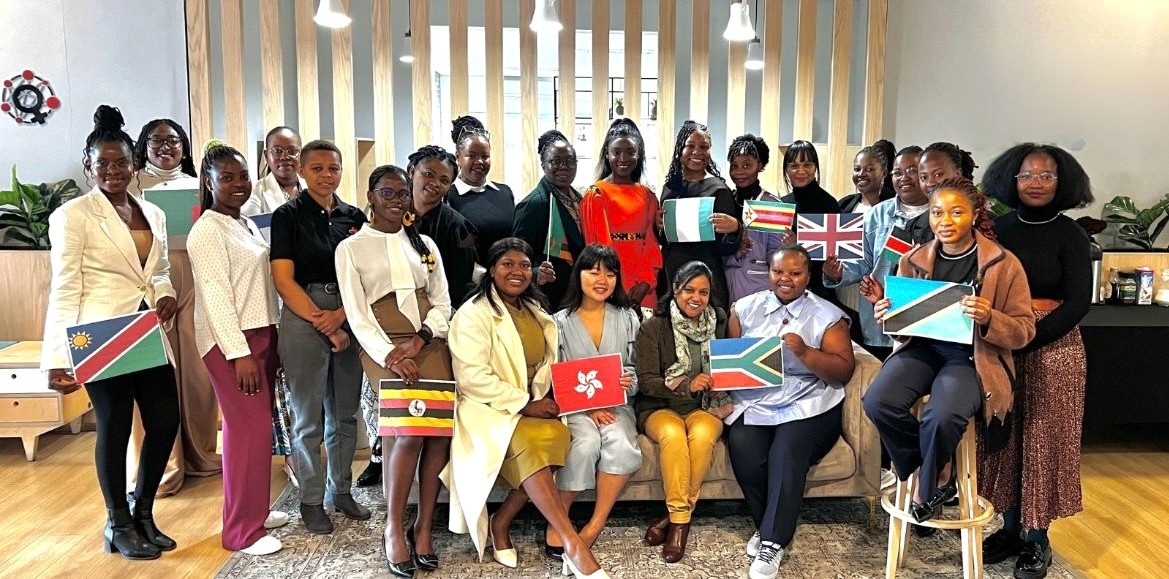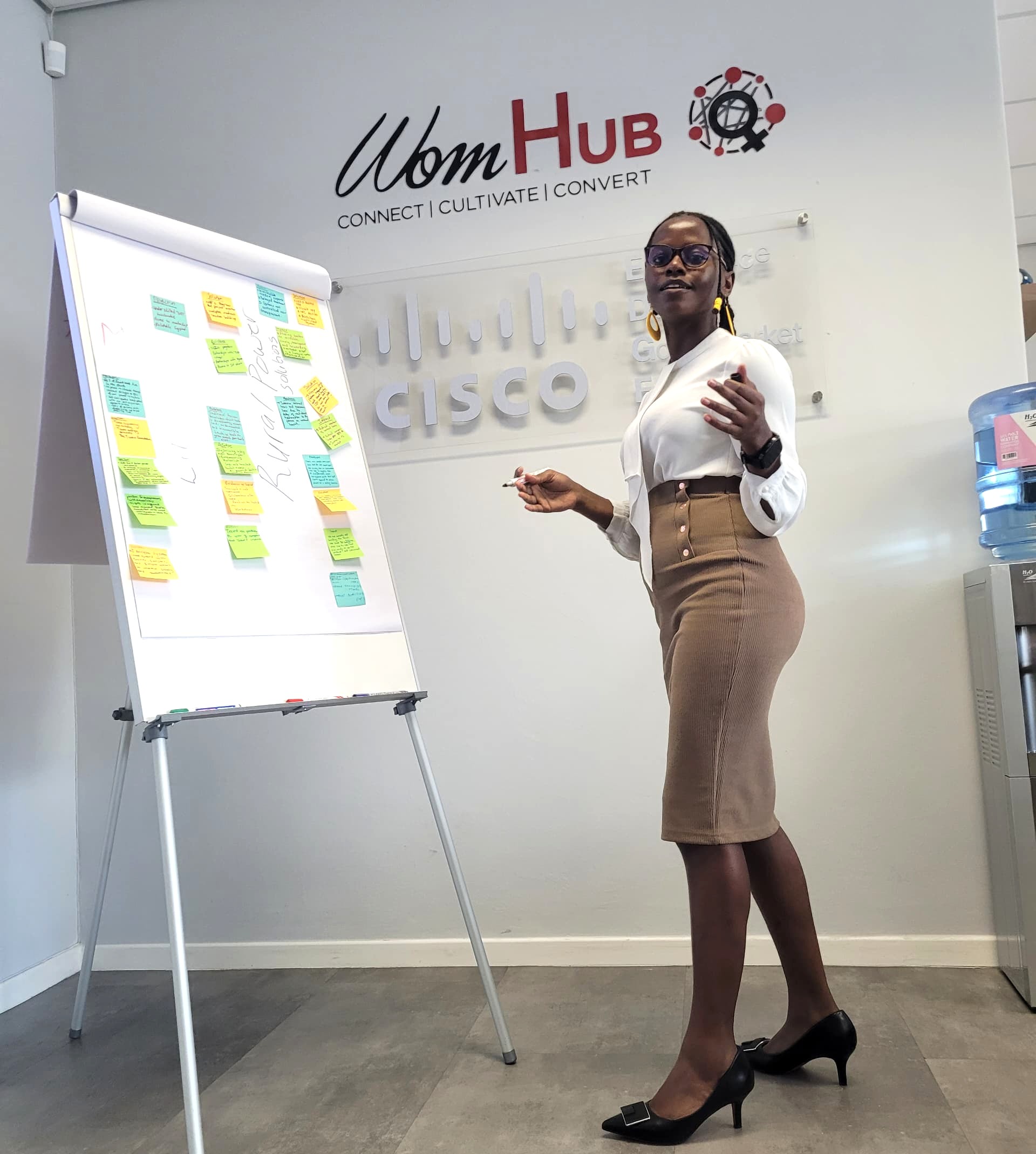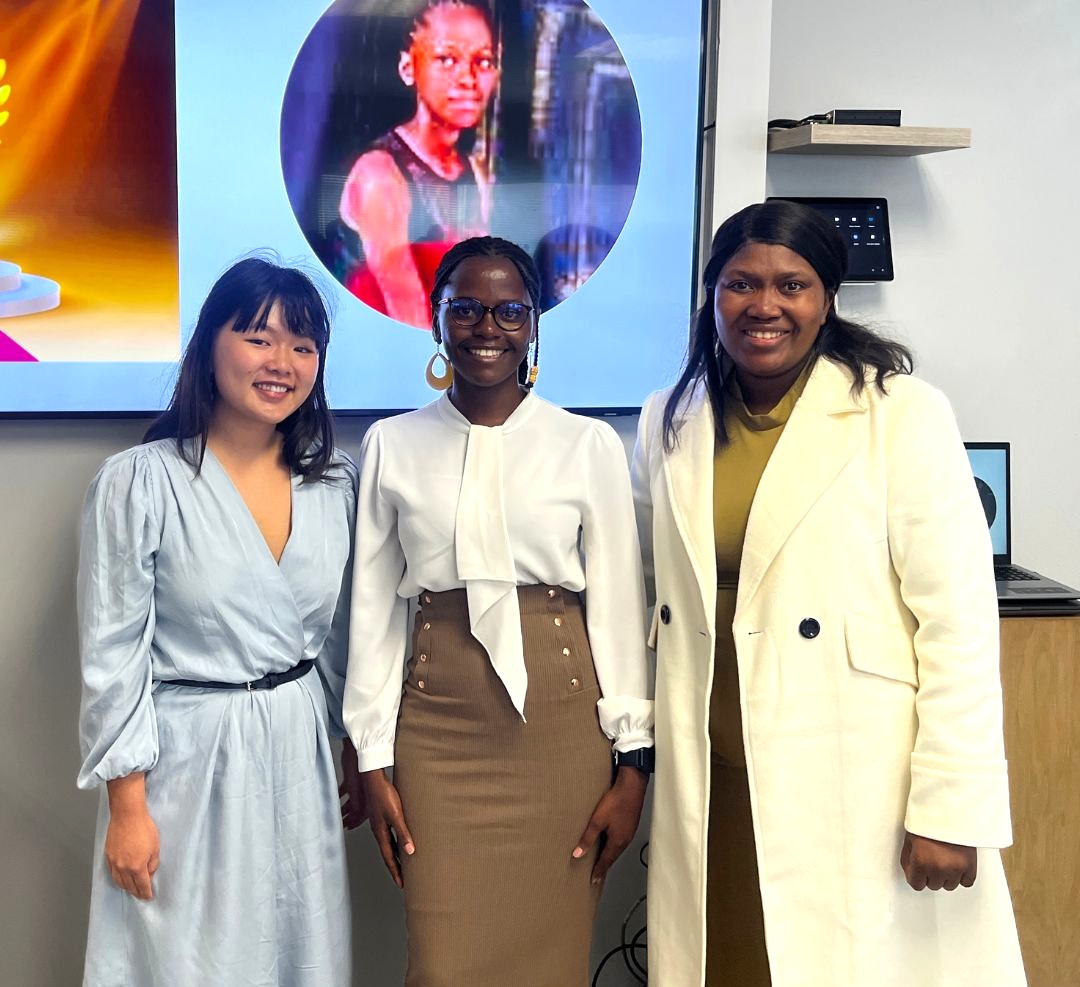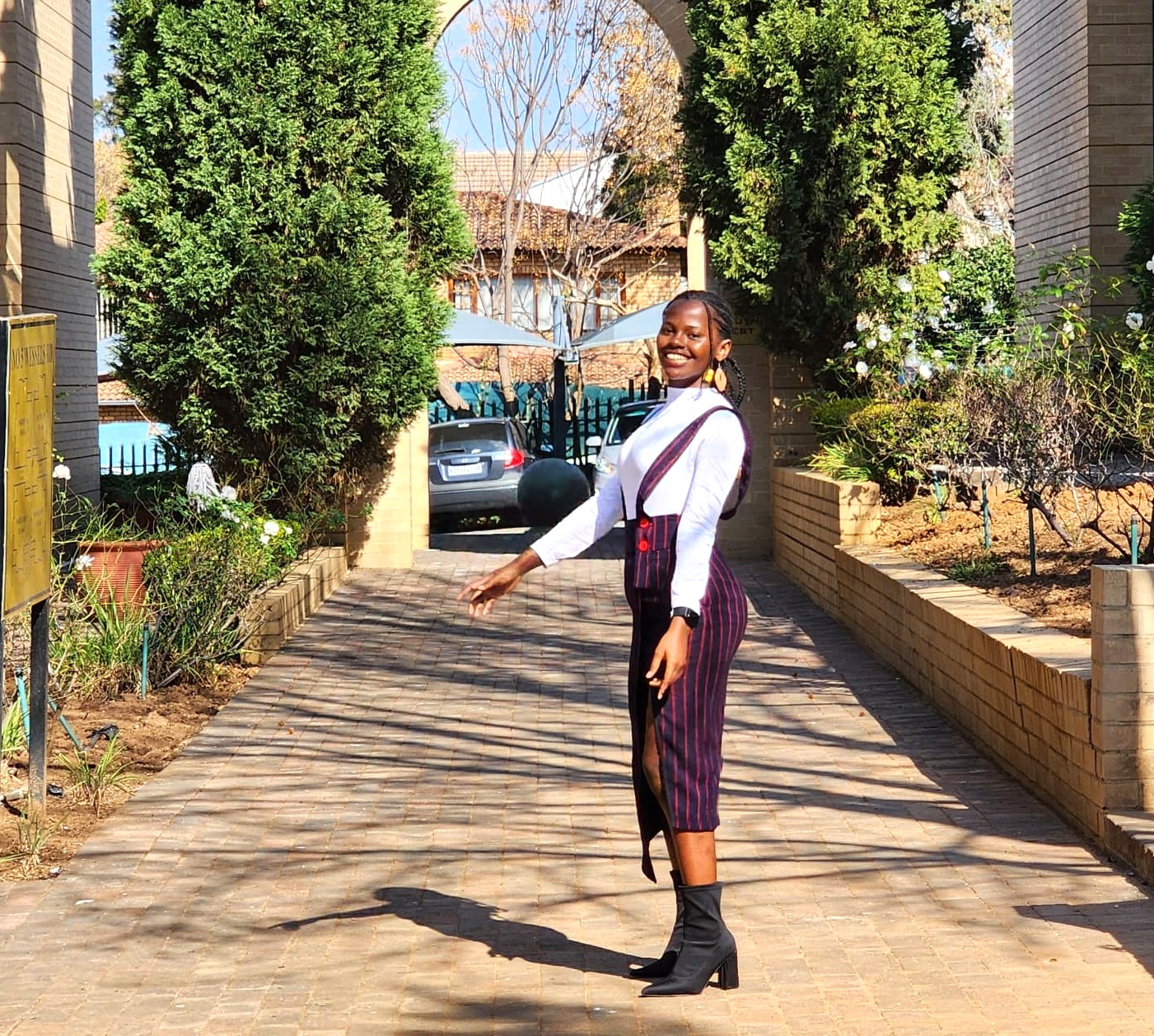Mak Computer Science Student Wins Africa Innovation Fellowship Award in South Africa

Kampala, Uganda — Christine Kikome, a finalist in the Bachelor of Science in Computer Science program at Makerere University’s College of Computing and Information Sciences (CoCIS), has emerged as the Best Pitch Winner at the prestigious Africa Innovation Fellowship (AIF) bootcamp in Johannesburg, South Africa. Kikome walked away with a prize of R10,000 (South African Rands) for her pioneering project FloralIntel – a digital health and education platform that uses artificial intelligence to identify medicinal plants and preserve indigenous knowledge.
The AIF, organized by South Africa-based WomHub in partnership with the Royal Academy of Engineering, brings together top women entrepreneurs from across Africa to showcase their innovative ventures. Kikome was selected for her outstanding pitch and impactful innovation.
The Selection Criteria
Kikome first learned about the Africa Innovation Fellowship through Mr. Marvin Galiwango, her lecturer, who encouraged her to apply following a research project in her second-year Machine Learning course. The project had developed into a functional prototype that used AI to identify medicinal plants.

With an already working Minimum Viable Product, Kikome applied and successfully navigated a rigorous selection process, including interviews that ran from August to December last year. She was chosen among the top 25 women-led startups on the continent.
The eight-month fellowship began virtually in January, following onboarding in December. Participants attended monthly sessions, with the program culminating in a physical bootcamp in Johannesburg from July 19. During the bootcamp, entrepreneurs received training in business leadership, personal branding, and pitching. Kikome impressed investors and judges on the final day, winning the Best Pitch Award and the accompanying R10,000 prize.
What Kikome Did to Emerge Winner
Kikome’s winning venture, FloralIntel, began as a course project during her undergraduate studies. Along with fellow Computer Science students Geofrey Okumu and Emmanuel Wagisha, and Gerald Obote, a final-year Biotechnologist from the College of Natural Sciences (CoNAS). The group developed a web-based application that integrates computer vision and machine learning to identify and classify traditional medicinal plants. The platform also connects users with certified herbalists, while preserving indigenous knowledge in digital format.
The innovation addresses the gap between traditional herbal medicine and modern healthcare, enabling accessibility and education for users interested in herbal treatment.
What’s Next for FloralIntel?
With a working prototype in place, Kikome’s next step is to scale FloralIntel into a mobile application and expand its reach across the continent. She plans to apply for more fellowships and seek further grants, including support from the Makerere University Innovation Hub.

“I want FloralIntel to educate the younger generation on herbal knowledge something that can save time, money, and lives,” she explained.
Unique Advantages of FloralIntel
FloralIntel stands out for its multifaceted approach to bridging traditional knowledge and modern technology. One of its most impactful features is the digitization of indigenous knowledge, creating a centralized digital database that preserves and documents traditional herbal practices—knowledge that has long been passed down orally and risks being lost. The platform also enables users to identify medicinal plants through a photo-based recognition system, which instantly provides details such as the botanical name, therapeutic uses, and instructions for application.
To ensure safety and credibility, Kikome envisions collaborating with institutions like the National Drug Authority (NDA) and Uganda Registration Services Bureau (URSB) to onboard verified herbalists who can offer both products and consultations through the platform.
Additionally, FloralIntel serves as a learning tool, offering educational content on herbal medicine, disease management, and daily updates on emerging health trends empowering users with accessible, trusted, and practical health knowledge.
Funding and Appreciation: What the Award Means to Kikome
All travel and accommodation costs for the South Africa bootcamp were fully covered by WomHub, with Kikome only covering her visa expenses. She credits her success to the foundational support provided by the CoCIS RISE Fund, which helped transition FloralIntel from a research concept into a viable prototype.
“This milestone would not have been possible without the foundational support of the COCIS RISE Fund, your mentorship, and Makerere University’s belief in student-led innovation,” Kikome wrote in a thank-you note. This recognition is not just mine, it is a win for the College and a testament to what is possible when academia, research, and innovation are aligned.”
To Makerere University, she expressed deep gratitude for the continuous support from lecturers and administrators. She appreciated Mr. Marvin Ggaliwango and other lecturers who mentored her throughout her academic journey as well as Dr. John Ngubiri the College Coordinator for RISE Funds.
“This award showcases Makerere’s commitment to homegrown innovations that address African challenges,” she added.
Kikome describes the win as a “powerful affirmation” of her passion for building tech-driven solutions that merge traditional knowledge with modern innovations. She also sees it as a demonstration of leadership potential.
“I’ve always wanted to be a leader from class representative to Guild Tribunal member. Founding FloralIntel and leading it to this achievement reaffirms that drive,” she noted.
To fellow students, especially young women, Kikome offers a message of empowerment: “Don’t hide your potential. You’re too visible to be broke.” She urged students to step out of their comfort zones and face challenges head-on.
To student leaders, she emphasized the need for collaboration. “Without teamwork among leaders, it’s hard to achieve meaningful impact on those we lead,” she warned.

Fighting the Odds – Surviving Three Brain Surgeries
Born to Mr. and Mrs. Musooka Drake in Kawanda, Wakiso District, Christine Kikome’s journey has been marked by resilience.
Kikome extended heartfelt thanks to her father, whom she described as her “core supporter.” Despite coming from a humble background, her father never discouraged her ambitions and, even supported her in identifying herbal plants from his knowledge and experience
Diagnosed with a brain tumor at the age of five, she underwent three surgeries – two at Mulago Hospital and one at Mengo Hospital. During her recovery, her grandmother encouraged her to use herbal remedies – an experience that later inspired FloralIntel.
Educated primarily on scholarships, Kikome attended Life Day and Boarding Primary School in Seeta-Bajjo, and Code High School for secondary education, majoring in PCM (Physics, Chemistry, Mathematics) at A-level.
She initially joined Makerere on private sponsorship for a BSc in Software Engineering, but later secured a government scholarship post-COVID for a BSc in Computer Science.
Reflecting on her personal journey, Kikome candidly shared her experiences growing up overcoming low self-esteem, and battling stereotypes that discouraged educating girls.
“I was often told I wasn’t beautiful, that I would disappoint my father if he invested in me because many girls drop off with pregnancies,” she recalls. “But I pushed through, got first grade in Senior Four, and proved my worth.”
She describes herself as passionate about leadership, innovation, and community impact. Though sometimes perceived as tough, she says she is a warm, encouraging person who brings positivity to those around her.
“I’ve always wanted to be seen for my brains – not my looks. And now I know, it’s not about your size, it’s about what you bring to the table.”
Kikome’s story is one of triumph over adversity, turning childhood medical challenges, stereotypes and socio-economic hardships into a source of inspiration and innovation.
Through FloralIntel, she aims not only to preserve Africa’s indigenous medicinal knowledge but also to prove that with resilience, mentorship and a supportive academic ecosystem, young innovators especially women, can change the future of health and technology in Africa.
Compiled and written by
Jane Anyango,
Principal Communication Officer.
